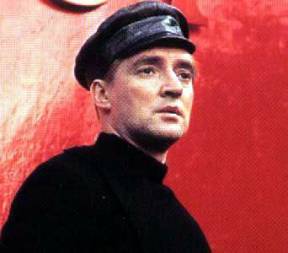#8: Fahrenheit 451 (1953) by Ray Bradbury
“Let me take you to the empty place in my fire engine.”--13th Floor Elevators
“Those who don’t build, must burn.”--Faber

Most people in the US read Bradbury’s (b. 1920) Fahrenheit 451 at some point. Perhaps because of Bradbury’s puritanical view of comics, fast cars, and music piped straight into the ear, high school teachers seem to be big fans and throw the book at students year after year, especially during a lesson on censorship and/or during banned books week. And why not? Fifty years later, don’t we see faint glimpses of Bradbury’s world around us: iPods, shrinking pedestrian zones, aggressive driving, flatscreen tvs, and the general sense of a faster world with less leisure time?

So you know the story: fireman Guy Montag rebels against a book-burning America after meeting a strange young girl, seeing a woman burn with her books, and actually sitting down with a couple of texts himself. What a strange and clumsy character Montag is--not really the stuff of legend. He’s almost unable to make decisions without some sort of input from another: his boss Beatty, a seventeen-year-old neighbor, the reclusive Faber. But he’s a man trapped in a morally confusing job with the status quo of society sleeping next to him in bed every night--a recipe for confusion. But Montag also has balls enough to recite poetry, burn the bejesus out of his superior, and cross the river to the land of intellectual hoboes. So let’s give him credit for that at least.

Something that really sticks out to me, having now read the book four times in my life, is how much more complex society is in the novel than how the official line (“It’s a book about censorship”) suggests. Bradbury suggests, I think, that it’s our society that creates the situation of Fahrenheit 451, not a fascist government coming to power and shoving censorship down the throats of its citizens. Literature becomes smaller and smaller (condensed novels, magazines, comic books, etc.) while more and more groups lash out at insensitivity and offensiveness in literature. This equation leads to voluntary book burning, and we can assume that’s when government stepped in to use the intellectual climate for its own agenda. Years later, most people don’t care. They get to drive as fast as they want, they have entertaining (maybe) and interactive tv to watch, and their homes are fireproof (what else could you ask for?). This all leads to a kind of amnesia. Firefighters don’t remember that they used to put out fires, not create them, and Montag’s wife Mildred can’t even remember how she met him. By the way, do you remember the major events of 2005 still? Or even what happened over the last summer? Just checking.
But what are Montag, Faber, and Granger (hobo intellectual) fighting for? The rights of the minority to be able to read? An eventual evangelism of the classics? The rebirth of literature itself? I think most of us come away from the novel thinking we know the answer. Most students would say free speech and the right to obtain and collect intellectual property. But what about literature itself? The depths, peaks, and valleys of it. The good and the bad. Sorrow and happiness. While Montag is able to elicit an emotional response from Mildred’s friend when he reads “Dover Beach” by Matthew Arnold to her, literature might be dead to him, too. Truffaut seems to have had the same thought. In the end of his film adaptation, Montag and the rest of “the Book People” pace through a snow covered field unemotionally reciting his or her “book” over and over. Is there any meaning left?




0 Comments:
Post a Comment
<< Home